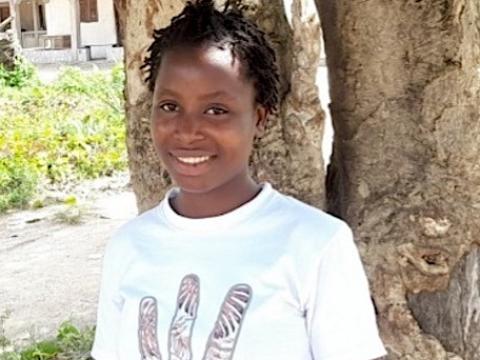Young researchers: Working to reduce teenage pregnancy

This content is by young researchers about their findings on teenage pregnancy in Koribondo Village in Southern Sierra Leone and what they are doing to tackle problems affecting children and adolescents.
Young people (aged 10–19 years) make up over 23% of Sierra Leone’s population (UNFPA, 2022). Many live in poverty and have inadequate access to health, education, and other basic services. In Koribondo village, teenagers drop out of school because some parents cannot afford to pay for school supplies and food. Others drop out due to child labour, early marriage, or teen pregnancy. World Vision has been working with our community to tackle the problems affecting children and adolescents.
In 2018, World Vision invited girls and boys from our village to join a research project. We applied and were successful to join the child researchers’ group. We received training on child-led research, during which we also discussed the topics we wanted to investigate. Of many possible topics, we agreed to focus on teenage pregnancy. This was because we saw an increasing number of girls – including some of our friends – who were getting pregnant and dropping out of school. We wanted to better understand the challenges girls face so that we could raise awareness and help tackle these issues.
The staff also helped us design data collection tools. We were each given the space to develop at least two questions. We discussed the questions in plenary until the final questionnaire was agreed upon. In our research questions, we asked if the girls were aware of contraceptive services available. To find out if food shortages are a contributing factor to teenage pregnancy, we asked how many times children eat per day. We also asked if they were concerned about teenage pregnancy. We interviewed teenage girls using the peer-to-peer methodology. We gained consent before all interviews, and our safety was ensured by pairing us up. The staff informed the community members that we would be asking questions to gather information.
Overcoming challenges
Working together was good for us, but we also faced some challenges during data collection. Sometimes people, including our peers, ignored us or were not willing to talk to us. Some people asked us to pay money to answer the questions. Others thought our research was not important or that we were not serious because we are too young, but we persevered.
To overcome these challenges, World Vision staff held meetings with community leaders and members to ask for their support. They explained how teenage pregnancy is affecting children and explained that by interviewing girls, we would be able to collect information that can help raise community awareness. The community was reluctant because they thought research is adults’ work, and it was the first time they had seen adolescents doing research.
Through a community workshop, we presented why we think understanding teen pregnancy is important and why we wanted to do the research ourselves. During the workshop, the community members agreed they would ensure our security. We also had daily meetings with World Vision staff to talk about what happened and how we felt during the interviews.
After the interviews, we met as a group to analyse the data. Each of the groups read their interview notes aloud while the rest wrote the main points on sticky notes. We grouped this information into three main drivers of teenage pregnancy: lack of parental care, health, and poverty. We also summarised the main impacts of teenage pregnancy. The staff helped us to write a report of our findings. After the research, we organised a small celebration of our achievements.
The next year, we shared the report with local stakeholders including some of the girls we had interviewed. We spoke at schools and visited people in their homes to raise awareness about teenage pregnancy.
Raising awareness
We are proud of what we achieved from this research. We gained the confidence to share our knowledge with our community. By sharing our findings, young people now have greater knowledge about how to keep themselves safe from abuse.
Our research and advocacy helped to raise community awareness about girls’ rights and the causes and impacts of teenage pregnancy. As a result, a new community by-law was formulated to reduce teenage pregnancy. It aims to help pregnant girls return to school.
In one community meeting, a headteacher said, "In the past, we didn’t see girls coming to the Basic Education Certificate Examination (BECE), now we are glad to see some of the pregnant girls coming back to sit their exams."
The by-law cautioned men about engaging in transactional sex with young girls, which is illegal in Sierra Leone. However, some girls we interviewed said they were having sex in return for food or money, for survival.
Our research also led to the creation of the Koribondo anti-teenage pregnancy task force, composed of community members, police, parents, adolescents, teachers, and health workers. It helps identify pregnant girls, sensitise community people about the issue and helps teenagers to access health services.
"We are the watchmen for our sisters in our community," said Mohamed, another peer researcher and task force member.
The research helped parents to better appreciate their responsibility for children’s care and education. Children and adolescents also became more respectful of their peers and their parents. We observed that people in the community saw us as role models. We also saw that school dropout rates and teenage deaths due to early pregnancy complications had reduced in our community. We have great hopes that we will see continued actions to prevent rape and forceful marriage.
Most importantly, our research and advocacy helped unite young people and made us realize we can engage in many ways to help our community. Our research group is ongoing, and we continue to be change agents in our community.